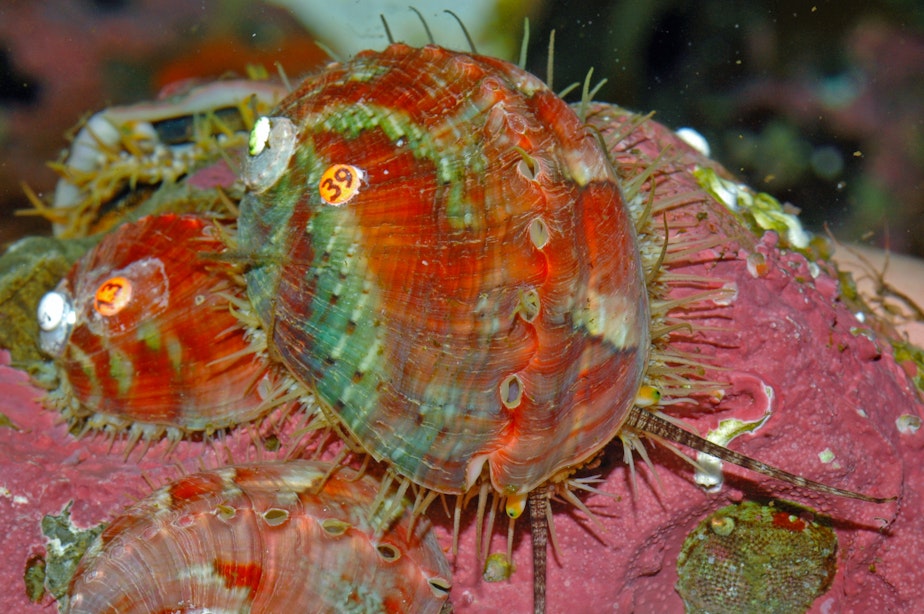Meet Washington's newest endangered species

Some endangered species in Puget Sound are almost as big as a school bus. Others can fit in the palm of your hand--like the pinto abalone, a sea snail found around the San Juan Islands and the Strait of Juan de Fuca.
The Washington Fish and Wildlife Commission has declared the abalone an endangered species, a designation aimed at helping it bounce back from a long, steep decline.
Populations of the colorful and reportedly tasty sea snail around the San Juans have dropped 97 percent since 1992.
“Pretty adorable for an invertebrate,” biologist Hank Carson with the Washington Department of Fish and Wildlife said of the giant, flat snail with a bright red shell. “It’s got a couple little eyestalks and some tentacles that stick out the front, too."
While some Puget Sound species (think salmon) have landed on endangered-species lists after their habitat’s been destroyed, that’s not the case with abalones.
“There’s a lot of good habitat,” University of Washington biologist Carolyn Friedman said.
"The simplest answer is that we took too many. We harvested too many," Carson said.
Even after Washington banned abalone harvesting in 1994, the snails remained so scarce that they couldn’t reproduce.
Abalones living near each other on the sea floor spew their eggs and sperm into the water at the same time. Currents play Cupid with some of those gametes, and some of the resulting larvae eventually settle onto patches of rock.
With some kelp or other algae to graze on, and luck avoiding predators like sea otters and sunflower stars, they’ll grow into snails up to six inches across.
But so few abalones are spread over such a large area that the eggs and sperm rarely bump into each other any more.
“There has not been a good recruitment event for many decades,” Friedman said.
Carson said no one has seen a young, wild abalone in Washington for 11 years.
To boost the stagnant populations, scientists with the Puget Sound Restoration Fund have raised and released 6,000 young abalones in shallow spots around the San Juans this year, on top of another 16,000 released over the past decade.
Endangered delicacy
There are 50 abalone species worldwide. Pintos are the only one in Puget Sound.
The first ocean invertebrate to be deemed endangered was Southern California’s white abalone, listed as an endangered species by the U.S. government in 2001.
In 2014, U.S. officials rejected environmentalists’ petition to list the pinto abalone as endangered. They reasoned that the abalone wasn't rare enough in the northern end of its range to merit federal protection, though Alaska had prohibited commercial harvest in 1996 and Canada listed the snail as endangered under its Species at Risk Act in 2009.
The International Union for the Conservation of Nature and Natural Resources listed the pinto abalone as globally endangered in 2006.
The U.S. Endangered Species Act allows specific populations of widespread species like Hood Canal summer chum or Puget Sound chinook to be added to the endangered species list, but it only allows such federal protection of invertebrate species if they are in trouble throughout their entire range.
Abalone meat is one of the world’s most expensive seafoods, with prices in China occasionally hitting $36 a pound.
Most abalone eaten today comes from farms, not the wild, but illegal harvest remains a lucrative proposition.
While poaching abalones was a big problem in Washington in 1980s and 1990s, Carlson said he doesn’t think it is any more.
“The fact is, now, it’s really hard to find them,” he said.
A newer threat is humanity’s carbon dioxide emissions. In addition to dangerously heating the planet, they are turning the sea more acidic.
Studies in Friedman’s lab found that pinto abalone larvae exposed to acidified water for 48 hours or more often died.
“When you have a species on the brink, any stressors are not going to be conducive to restoration,” Friedman said.
In May, the Washington legislature quadrupled funding for abalone restoration, now up to $450,000 a year for the next two years.
The state's endangered listing means up to 5 years in jail and a $10,000 fine for anyone who illegally harvests pinto abalone.




